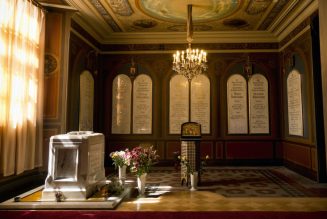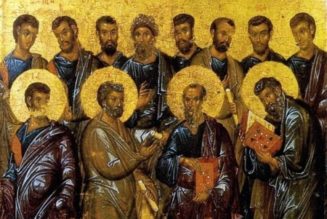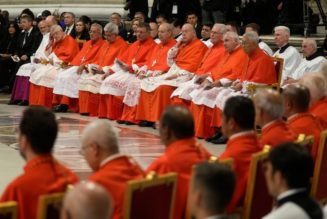, December 26, 2019
 The family is essential to society’s health and a rock of emotional security to all who give themselves to it.
The family is essential to society’s health and a rock of emotional security to all who give themselves to it.
Family life is difficult drudgery and can have a heart-numbing effect on our dreams and hopes.
This Sunday, the feast of the Holy Family of Jesus, Mary and Joseph Year A, the readings show both.
For Joseph in today’s Gospel, family life is a combination of high purpose and hard work.
The Gospel begins with the departure of the magi and the message of an angel. It is hard to imagine a more exalted moment for a father, when great men have sought out his child and angels intervene for his safety.
But the message of the angel must have been hard for Joseph to take: “Rise, take the child and his mother, flee to Egypt, and stay there until I tell you. Herod is going to search for the child to destroy him.”
Joseph probably thought that being the caretaker of his child would work to his advantage in certain ways — but his high calling didn’t make life any easier for him. You even get the sense from the reading that Joseph had to wake everybody up to leave in a panic as soon as the angel’s message came in his sleep: “Joseph rose and took the child and his mother by night and departed for Egypt.”
How did he find shelter, food, and water on the 400-mile trip? How did he find a way to support his family once he got there? The Gospel doesn’t say. It does mention that he didn’t even get to decide when to return or home where to live once he did. God decided all of that, through the angel.
We all find ourselves in the same predicament as the Holy Family.
God could not have exalted the family more than he did by joining one. His act tells us that family is vitally important to society and to us. Today, this is truer than ever. “The individual today is often suffocated between two extremes represented by the State and the marketplace,” wrote St. John Paul II. “At times it seems as though man exists only as a producer and consumer of goods, or as an object of State administration.” There is one place where we are appreciated in and of ourselves, he says: The family.
Our families are the rock center of our lives. They create our identity – by biology and by upbringing. Studies show that family life benefits everybody: husband and wife and the children they raise together are healthier, less likely to become addicted to drugs, less likely to be in trouble with the law, more likely to succeed financially.
But the problem is that family life is so hard, people often flee it.
Our families are not just centers of great peace; they are sources of enormous pain. There are misunderstandings, failings, unkindness and unforgiveness, slights small and large. Families smother us or disappoint us. Families fall into bitter dysfunction or simply fall apart.
The fact that family life is tough, in fact, is paradoxically why they it is so beneficial — our families force us out of our narcissistic focus on ourselves, they solve the twin problems of pride and low self-esteem, and they give us an almost unavoidable way to live out the commandment to serve others before ourselves. This hurts us, then saves us.
How to survive the uphill battle of family life? Follow the Holy Family.
We pray at Mass this Sunday: “God, who was pleased to give us the shining example of the Holy Family, graciously grant that we may imitate them in practicing the virtues of family life and in the bonds of charity.” There are three clear ways to do this.
First, put Jesus Christ in the center.
The Holy Family literally centered their life around Jesus. St. Paul in the Second Reading says we do the same, by prayer and focus on Scripture: “Let the word of Christ dwell in you richly … singing psalms, hymns, and spiritual songs with gratitude in your hearts to God.”
Go to Sunday Mass together and pray the Rosary every night to make Jesus a part of daily life.
Second, make your home a school of virtue.
“In all wisdom you teach and admonish one another,” he says, and lists the virtues needed: “heartfelt compassion, kindness, humility, gentleness, and patience, bearing with one another and forgiving one another.”
Every family needs one member to start acting with love. As Mother Teresa put it, “Whatever you do for your family, your children, your husband, your wife, you do for God.”
Third, Paul gives advice that rubs against the grain of our culture.
In our culture, wives are too often left to run everything, often by default, while the father acts like “one of the kids” or like the oafish dads in our media. But Paul tells wives to put their husbands forward and surrender some control.
In our culture, husbands too often ignore their wives, tuning them out with screens or alcohol or by leaving altogether, using them to get what they want but never dedicating themselves to serving them in the home. Paul tells husbands to love their wives and avoid bitterness toward them.
In our culture, children disappear into their own worlds through devices and individual pastimes, ignoring their parents. St. Paul tells children to obey their parents, and for fathers not to push them away.
None of this is easy for anyone. But the benefits are described beautifully this Sunday.
“God sets a father in honor over his children; a mother’s authority he confirms over her sons,” says the first reading, from Sirach.
A strong family is life-giving, says the Psalm, “like a fruitful vine in the recesses of your home …like olive plants around your table.”
Christmas break gives us a great image of what the family can be: Everyone together, in the glow of the birth of Jesus, giving and receiving gifts with each other.
That vision can last year-round if we “Let the peace of Christ control your hearts,” says St. Paul. Just like the Holy Family.
Image: Ashley Van Haeften.
Tags: Holy Family Sunday Year A, prayer, Sunday Gospel, Sunday Readings
Never miss a post! Subscribe below to our weekly newsletter.








